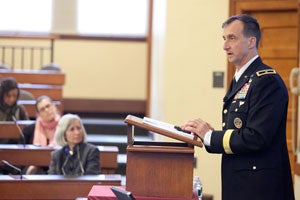Army Brigadier General Mark Martins ’90 accepted the Medal of Freedom, the highest honor conferred by Harvard Law School, and gave the inaugural Dean’s Distinguished Lecture on April 18 at HLS.
Bestowing the award, Dean Martha Minow said: “I don’t need to tell this audience that we are living in a challenging time for our country, for the world, and for the values of freedom, and the rule of law to which this school is devoted. This is a time where we so need wisdom, courage, steadfastness and clarity. We need grownups who lead and inspire by example; soldiers who are scholars; patriots who recognize the thirst among all peoples for justice, security, fairness and accountability. How lucky this nation is that Mark Martins has given these enormous talents and gifts precisely in these ways.”
 |
| Brig. Gen. Mark Martins ’90 and HLS Dean Martha Minow |
The Harvard Law School Medal of Freedom was established to honor the achievements of individuals who have worked to uphold the legal system’s fundamental commitment to freedom, justice, and equality. It has previously been awarded to the Brown v. Board of Education litigation team, Chief Justice of Pakistan Iftikhar Chaudhry, and to South African President Nelson Mandela.
Accepting the award, Martins said: “While bowing deeply to accept the high honor of this Medal of Freedom, I also welcome the opportunity to speak at Harvard—America’s oldest law school and the school that has produced so many leading thinkers and citizens.”
In September 2009, Martins was assigned as interim commander of the then newly-established Joint Task Force 435, and he was deployed to Afghanistan. One year later, he assumed command of the newly established Rule of Law Field Force – Afghanistan, which provides essential field capabilities, liaison and security in partnership with Afghan and coalition civil-military rule-of-law project teams in non-permissive areas of the country.
In these roles, Martins has led the effort to reform United States detention operations in Afghanistan, and he has repeatedly stressed that continued progress in Afghanistan depends not only on strengthening the democratic process but also on building the rule of law, particularly in dealing with counterinsurgents.
In his lecture, Martins said: “[Afghanistan’s] lack of governance … is accompanied by a lack of confidence in the government’s ability to deliver justice, resolve civil disputes and address a perceived culture of impunity among the powerful,” Martins told his HLS audience. “Establishing the rule of law in these districts is critical to the kind of sound governance that will enable an enduring transition of security responsibility to Afghan forces and deny that rugged country as a sanctuary for global threats.”
Martins discussed the key role that lawyers play in the complex machinery of U.S. military operations. “Because of their work ethic, creativity, intelligence, and common sense; because of their ability to think and write quickly, persuasively, and coherently; and because of their talent for helping leaders set the proper tone for disciplined and successful operations—I and other commanders tend to deploy as many field-capable lawyers as we can.”
He highlighted examples of U.S. strategy for the development of the rule of law in Iraq and Afghanistan, and discussed possibilities for moving forward.
“Rule of law in Iraq and Afghanistan remains mostly just a goal, but also an indispensable one [and] the challenges are very practical ones,” he said. “The strengthening of traditional dispute resolution at the local level is one of the most efficient and effective ways to achieve the kind of security and stability that can enable transition of responsibility to the Afghan government and its forces, and protect our own core national security interests.”
Commissioned in the infantry after graduating first in his class from the United States Military Academy, Martins was valedictorian of West Point’s class of 1983. He then earned first-class honors as a Rhodes scholar at Oxford in 1985, and earned his J.D. magna cum laude from HLS in 1990. He holds an LL.M. in military law and a master’s degree in national security strategy.
Since becoming a Judge Advocate through the Army’s Funded Legal Education Program, he has served in a variety of assignments as an Army lawyer: Chief of Administrative Law and Chief of Legal Assistance at the 101st Airborne Division and Fort Campbell; as a professor of international and operational law at the Judge Advocate General’s School in Charlottesville; as a deputy staff judge advocate in Germany, with duty in Kosovo as chief of staff of all U.S. Forces; and, later, as legal adviser to the commanding general, Task Force Falcon.
He supervised a legal staff of more than 100 military and civilian attorneys and paralegals as a staff advocate to the commanding general in Germany and, in 2003, he organized law teams in and around Baghdad.
He went on to serve as deputy legal counsel to the chairman of the Joint Chiefs of Staff in Washington, D.C., with duty in Baghdad as counsel to Multinational Security Transition Command–Iraq; and staff judge advocate for Multi-National Force – Iraq.
Among those on hand for the ceremony and lecture were HLS Professors Jack Goldsmith, Louis Kaplow, Daniel J. Meltzer, Frank I. Michelman, Alan A. Stone, and Detlev F. Vagts.

